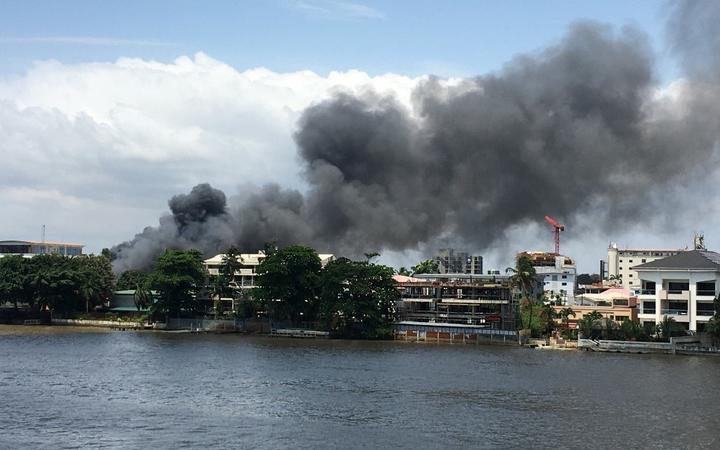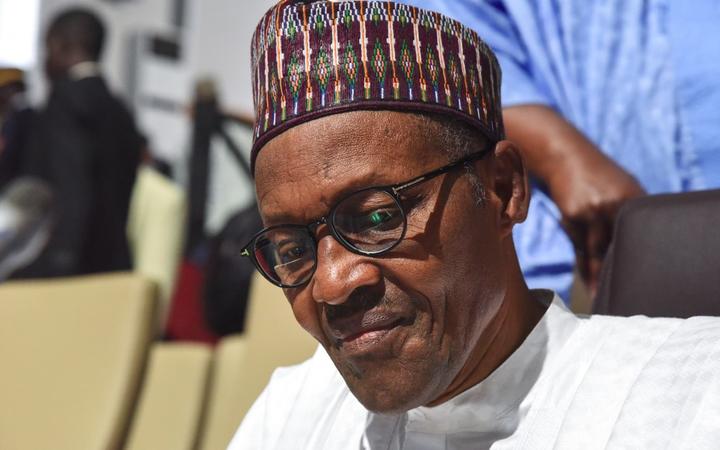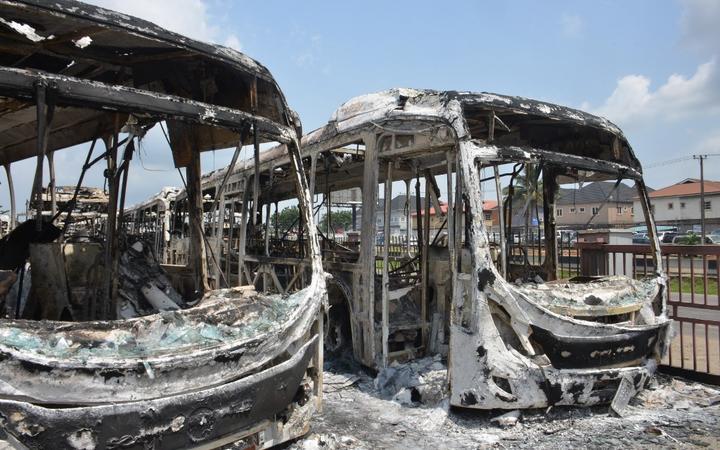Nigeria police brutality protests: president says dozens have died
Nigerian President Muhammadu Buhari says 69 people have been killed in protests against police brutality that have rocked the country.

Protesters man a barricade on a highway near the capital, Lagos. Photo: AFP
The deaths were mainly civilians but include police officers and soldiers.
The president announced the toll in an emergency meeting with former Nigerian leaders aimed at finding ways to end the unrest, his spokesperson told the BBC.
A group that has been key in organising the demonstrations has now urged people to stay at home.
The Feminist Coalition also advised people to follow any curfews in place in their states.
The protests have drastically subsided but an uneasy calm remains in several cities.
Officials said a curfew introduced in Lagos state would be eased.

A prison was set on fire in Lagos during the unrest. Photo: AFP
The protests in Nigeria began on 7 October with mostly young people demanding the scrapping of a notorious police unit, the Special Anti-Robbery Squad (Sars).
The unit was dissolved days later, but the protests continued, demanding broader reforms in the way Nigeria is governed.
They escalated after a shooting in the nation’s biggest city, Lagos, on Tuesday, when rights group Amnesty International says security forces killed at least 12 people. Nigeria’s army has denied any involvement.
At yesterday’s virtual meeting, President Buhari, 77, said his administration was committed to meeting the demands of the protesters. But he said his government would not fold its arms and allow criminals who had hijacked the protests to continue to perpetrate “hooliganism”.
The president told the meeting that 51 civilians, 11 police officers and seven soldiers had been killed in the unrest, his spokesperson said. It was not immediately clear whether these figures included the protesters allegedly killed by security forces in Lagos on Tuesday.

President Muhammadu Buhari says he wants to meet protesters’ demands. Photo: AFP
The president previously made a short televised address in which he urged protesters to stop demonstrating and instead engage with the government “in finding solutions”.
He faced criticism for not mentioning the Lagos shootings.
Police officers face charges
Lagos and other parts of the country have seen buildings torched, shopping centres looted and prisons attacked since Tuesday night’s shooting.

Two dozen buses were destroyed during the protests. Photo: AFP
The protests have now subsided, with barricades and police checkpoints dotting empty streets in Lagos yesterday, AFP news agency reports.
The city was placed under a 24-hour curfew amid the mass protests. But the state government said the curfew would be lifted later today.
The state’s governor, Babajide Sanwo-Olu, also published a list of 23 police officers who have been charged or are waiting to be charged with various offences relating to brutality. The charges include murder, manslaughter, involuntary manslaughter, armed robbery and causing grievous body harm.
He said he had published the list to show he was “rebuilding Lagos and ending police brutality”.
The south-west state of Osun also suspended a 24-hour curfew imposed to deal with the riots.
The Feminist Coalition earlier encouraged “all young Nigerians to stay safe, stay home, and obey the mandated curfew in your state”.
“We are merchants of hope. Our priority is always the welfare and safety on the Nigerian youth,” it said.
The group said it would no longer be taking donations for the #EndSARS protests.
– BBC
